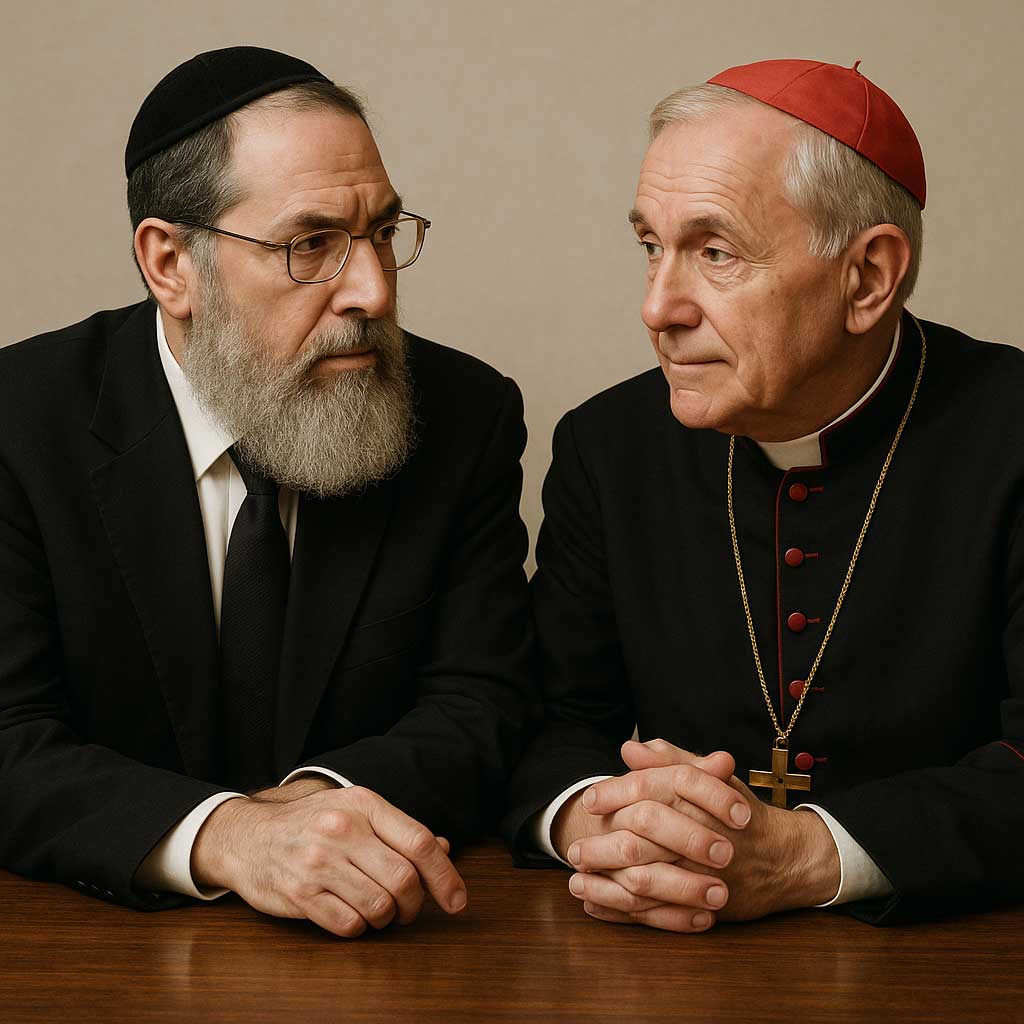
I’m moving backwards.
In my first piece, I wrote about how Jews and Christians can have better interfaith conversations when they are sitting at the table and talking. This piece is about how to get Jews and Christians to come sit at the table in the first place.
Because after 1,500 years of anti-Semitic preaching, persecution, and violence emanating from the Catholic Church and basically all Protestant sects, why should Jews trust modern Christians enough to sit down and talk with them? Sure, in the 1965 Vatican II document Nostra Aetate, Catholics made a stab at apologizing for anti-Semitic violence and voiced a commitment to being more tolerant. But so what? Perhaps it’s a day late and a dollar short. Maybe we are better off leaving them alone and being left alone.
Jewish-Christian Relations
This would be a familiar position on the issue to most Orthodox Jews, and even some non-Orthodox ones. Especially after the Holocaust, many Jews are simply more interested in protecting themselves against future violence than in embracing their past sworn enemies. That’s not an exaggeration either: while individual Christian neighbors and religious authorities did heroic acts to save Jews during the Holocaust, the overwhelming majority looked the other way or even turned their neighbors in. So there definitely is good reason for Jews to be insular by nature and to resent attempts at reconciling and dialogue-ing with Christians.
I acknowledge all that.
But times have changed. Look objectively at what the Catholic Church has said and done regarding relations with the Jews over the past 50 years. The record speaks for itself. The Church has:
1. Taken responsibility for its role in contributing to historical anti-Semitism
2. Offered apologies and sincere regrets for their past transgressions
3. changed age-old prayers and rituals to remove anti-Semitic lines.
Just by way of one illustration, the traditional Good Friday Prayer for the Jews used to read:
“Let us pray also for the faithless Jews: that Almighty God may remove the veil from their hearts; so that they too may acknowledge Jesus Christ our Lord.”
After several rounds of changes by Popes Pius XII and John XXIII, the prayer took on its current form after the Second Vatican Council. Today, it reads:
“Let us pray for the Jewish people, the first to hear the word of God, that they may continue to grow in the love of his name and in faithfulness to his covenant.”
That’s an incredible change, especially for the Catholic Church— one of the most conservative institutions around. Despite being so rooted in tradition and against change, the Church has been remarkably committed to changing prayers and rituals that portray Jews negatively.
Repentance and Reconciliation
Another important document that shows the church’s evolution on relating to Jews is the handwritten prayer submitted by Pope John Paul II when he visited the Western Wall in Jerusalem in 2000. He wrote:
“God of our fathers,
you chose Abraham and his descendants to bring Your name to the nations:
we are deeply saddened
by the behavior of those
who in the course of history
have caused these children of Yours to suffer, and asking Your forgiveness
we wish to commit ourselves
to genuine brotherhood
with the people of the Covenant.”
There is much more to be done, of course. But the Church has taken some giant steps in the direction of repentance and reconciliation with their Jewish brethren.
In an address at the Great Synagogue of Rome in 2010, Pope Benedict XVI said:
“The Council gave a strong impetus to our irrevocable commitment to pursue the path of dialogue, fraternity and friendship, a journey which has been deepened and developed in the last forty years, through important steps and significant gestures…I too, in the course of my pontificate, have wanted to demonstrate my closeness to and my affection for the people of the Covenant.”
The Church has been on a journey since Vatican II and I see no reason to doubt their sincerity. This is major; no Pope before 1965 would have ever talked about dialogue and friendship with the Jews. And now, suddenly, every single pope since 1965 has talked about this! These sentiments have cropped up too often in church documents and papal speeches for me to believe it is all a ruse. Heck, these days, the current Pope is best friends with a rabbi (Abraham Skorka), who he even co-wrote a book with in 2013!
But how should Jews respond to all of this? One camp says to embrace these Christians with open arms, like Skorka does. Another camp says run away and don’t look back.
While I think it’s always wise to exercise caution, I also think our faith communities need to be more united. In an increasingly secular age, it’s essential that the great Abrahamitic faiths grow closer, and find strength in discovering what it is that can bond and bring us together.
So while my first post about interfaith dialogue emphasized acknowledging our differences and disagreements about issues of faith, this post says that we should pursue thprocess because the Church truly has changed and we truly do have more in common than ever before (or at least since Paul was around!). So, combining my first post and this one, our two-part mission is set: come to the table with trust and goodwill in our hearts, but unafraid to disagree and state our differences.
P.S. I’m debating whether to continue writing about Jewish-Christian relations, or whether I should take a break from this mini-obsession and delve into other topics. Let me know in the comments.
















